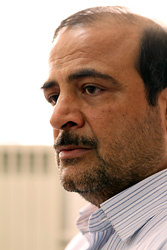Iran—Confident of Syria

Damascus, on the other hand, has enjoyed strategic diplomatic relations with Iran for some time, perhaps for as long as the Islamic Republic has been in existence itself. (Post-revolution close relations quickly turned into a strategic alliance in the early 1980s, when the late father of Bashar Assad, President Hafez Assad, became the only Arab leader in the Middle East to side with Iran during its eight-year war with Saddam Hussein’s Iraq). Iran and Syria, nevertheless, do not seem to be willing to try to limit each other in certain diplomatic issues, such as in the case of Iraq, where Iran and Syria’s strategies hardly overlap. But both countries believe in non-interference, and respect independence in decision-making, in Mesopotamia.
Tehran’s and Damascus’ policies do accord with each other, however, in the case of a Palestinian State and in the Occupied Territories. For several decades, the Syrians supported a consensus-based stance against Israel as the best means to serve the collective demands of the Arab nation. Nevertheless, when Egypt and Jordan started direct negotiations with the Jewish State—which led to establishment of ties—and other Arab states moved towards normalization of ties with Tel Aviv, Syria sensed the winds of change and turned towards brokered negotiations as a way to maintain both its anti-Israel stance and regain its rights.
Syria did not initiate indirect negotiations with Israel without assuring Iran –their key regional ally- that they will never betray the cause of Palestinians. At the moment, however, the Syrians have come to the belief that mediated talks with Israel are fruitless, since Tel Aviv apparently does not believe in peace and will never agree to the return of the Golan Heights—Syrian territory its army occupied in the Six Day War of 1967.
When considering Bashar Assad’s comments on Iran’s green light for 2008 peace talks, one should not look for an official letter of consent as proof. Iran is assured of Syria’s unalterable principles and knows that Damascus will never abandon its principle demands –the return of the Golan Heights and an end to the occupation of Palestinian Territories. As such, Tehran has no issue with indirect negotiations between Damascus and Tel Aviv conducted in a manner that leads to the Syrians being able to reclaim their territory.

